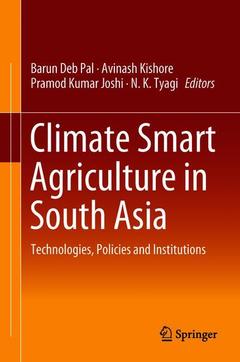Climate Smart Agriculture in South Asia, 1st ed. 2018 Technologies, Policies and Institutions
Coordonnateurs : Pal Barun Deb, Kishore Avinash, Joshi Pramod Kumar, Tyagi Narendra Kumar

Chapter 1: Two way association between agriculture and climate change.- Chapter 2: Prioritizing climate smart interventions across various agro-climatic region.- Chapter 3: Adoption of climate smart technologies in Indo-Gangetic Plain in South Asia.- Chapter 4: Role of Women in adoption of climate smart technologies and practices in drought prone zone.- Chapter 5: Were the past government policies climate smart? A review for South Asia.- Chapter 6: Insurance, compensation and institutions for climate smart agriculture.- Chapter 7: Prioritizing investment for climate smart agriculture – A Bio-Economic model.- Chapter 8: Climate smart agriculture – a need indeed for future agricultural development in South Asia.
Dr Barun Deb Pal is a Program Manager at the International Food Policy Research Institute (IFPRI) - South Asia chapter, New Delhi, India. He received his Master’s in Economics from the University of Calcutta, India and his PhD from Jadavpur University, Kolkata, India. He has more than 10 years of experience in economic policy modelling with a special focus on climate change policy analysis. He has many research articles and books to his credit. His most recent articles have been published in the Journal of Economic Structures, Economic Systems Research, Journal of Science and Technology, and his co-authored book “GHG Emissions and Economics Growth – A Computable General Equilibrium Model Based Analysis for India” was published by Springer.
Dr Avinash Kishore obtained his Master’s in Public Affairs from Princeton University, USA and his PhD in Public Policy from Harvard University, USA. He is interested in agriculture, environment, and development economics. At the International Food Policy Research Institute (IFPRI) South Asia chapter, New Delhi, India he is working as a Research Fellow and is engaged in research projects that seek to bridge the gap between laboratories and farms in Indian agriculture using action research in collaboration with agricultural universities, agribusiness firms and farmers. He has published more than 15 articles in journals of international repute like Water International, Water Policy, Food Policy, Economic Development and Cultural Change and Economic and Political Weekly.
Dr Pramod Kumar Joshi is Director of the IFPRI - South Asia chapter, New Delhi, India. His areas of research include technology policy, market, and institutional economics. Dr Joshi is a recipient of many awards such as the Dr MS Randhawa Memorial Award of the National Academy of Agricultural Sciences (2009–11), Prof RC Agarwal Lifetime Achievement Award of the Indian Society of Agricultural Economics, DK Desai Award of the Indian
Delineates policy options and institutional arrangements to accelerate adoption of climate smart agriculture in the region
Provides future directions of agricultural research under progressive climate change impacts
Date de parution : 09-2019
Ouvrage de 226 p.
15.5x23.5 cm
Disponible chez l'éditeur (délai d'approvisionnement : 15 jours).
Prix indicatif 168,79 €
Ajouter au panier